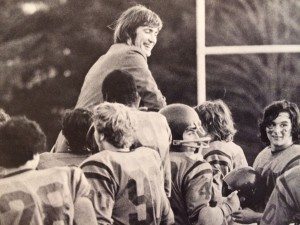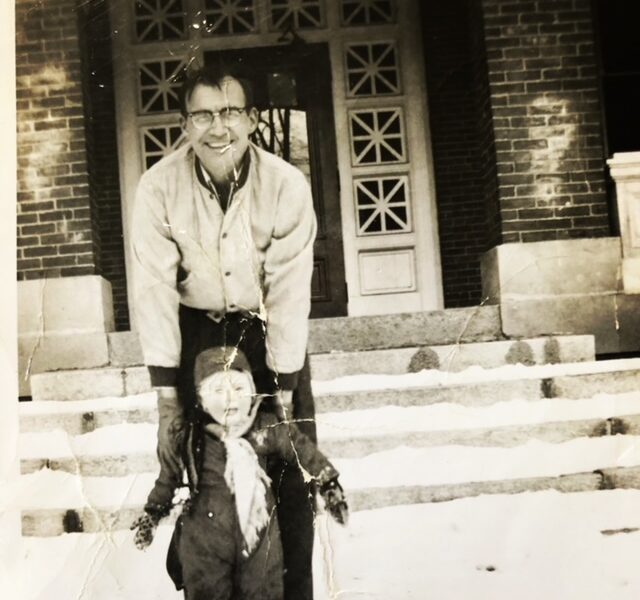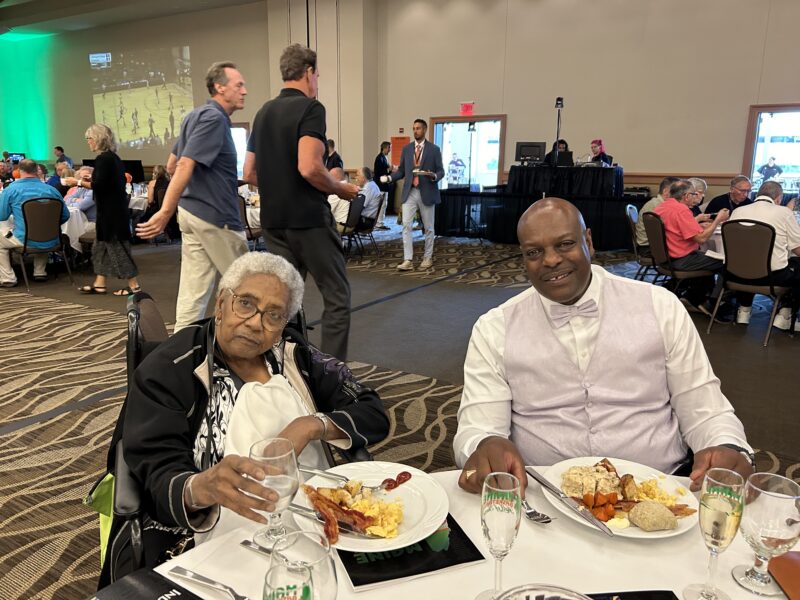
It is my sad duty to report the passing of Ed Legg – Hyde teacher, coach, head of school (1968 to 1982) – who died unexpectedly at his home in Kennebunk, Maine on August 10.
As hard as it may be to fully explain the depth of Ed’s influence on Hyde, I thought I would take a moment to express what he meant to me personally and also illustrate some of the impact he had on 100s of students, families, and peers during Hyde’s early years.
I first met Ed in the summer of 1968. He, Ann, and young Shannon (I’m guessing she was all of two-years-old.) had just arrived in Bath, and my mother had volunteered me to babysit one evening. Shortly after I arrived at their Mansion apartment – Not a misprint. The Legg family first lived in what is now the Dean’s Office in the Mansion. – and was making acquaintance with Shannon, the largest dog I had ever seen in my life bounded out of the bedroom and jumped me. (Surely, you older alums remember Aardvark?!?) Terrified, I jumped up on top of the nearest piece of furniture I could find. Thankfully, Shannon took charge, scolding the beast for being so rude and banishing him to the back room. (Who was babysitting whom?)
Only a few weeks later, as a freshly enrolled Hyde Summer School student, I found myself in Ed’s English Literature class. We focused on John Knowles’ A Separate Peace (The perfect choice for a group of boys starting out in a then all-boys boarding school!) and Ed taught us how to break it down, pointing out nuances and details I had never considered before. Later in the course, Ed painstakingly worked with me one-on-one on an analysis and book report on James Baldwin’s Go Tell It on the Mountain. I didn’t look at books the same way after that.
I went on to major in U.S. History in college, a subject I taught for 20+ years and continue to study today. I can think of no teacher who had a bigger impact on my love for and approach to history than Ed did. His U.S. History and Government courses were perhaps the signature academic courses at Hyde throughout the 70s. Whether the topic was constitutional law or Frederick Jackson Turner’s Frontier Thesis, Ed’s passion for the subject was both informative and infectious.
As good as he was in the classroom, Ed was as good if not better in the athletic arena, coaching championship teams in football, wrestling, and both men’s and women’s basketball. Many alums join me in remembering a 1969 football game against Cardinal Cushing Academy, a powerhouse Massachusetts team that had been crushing its opponents by 60+- points. (The school is no longer in existence.) Not only did Ed design a brilliant strategy, he had us all walking out onto the field convinced that we had a legitimate chance to win. Amazingly, we were down by only a touchdown at halftime and wound up losing by a respectable score at the end. That was the moment I first sensed, “This guy really has something.”
After college, I joined the faculty while Ed was the head of school and observed that the same inspirational impact he had on kids he also had on the faculty and school community at large. Perhaps his greatest legacy at Hyde was his role as founder and director of America’s Spirit, a program that began innocently as a way to celebrate our country’s bicentennial and evolved into a nationally respected performing troupe that took the stage in such venues as Broadway’s Circle in the Square Theater, the Kennedy Center for the Performing Arts in D.C., the Martin Luther King Community Center in Atlanta, the John F. Kennedy Library in Boston, and on and on. In addition to wowing audiences all over the country, we also packed them in in our own Student Union Theater on hot summer nights and routinely sold out the Phyllis Thaxter Theater in South Portland so many times that it essentially became our home base. These were exciting times at Hyde. Log on to the America’s Spirit Facebook page to see recollections and remembrances of past cast members.
Years ago in a faculty meeting we were asked to identify the five teachers we perceived to have had the most profound impact on our lives. Ed Legg was a quick pick for me. He was a great teacher and coach during my youth. He was an equally great mentor as an employer. Given that Laura and I both felt that Ed had helped us visualize and act upon a view of our best selves, we asked him to perform our 1979 marriage ceremony in the Mansion. He had that effect on us, on our peers, on academic classes, on athletic teams, on performing arts ensembles, and on whole schools.
On behalf of everyone at Hyde, I thank you, Ed, for all you have done for so many of us. May you rest in peace, and best wishes to Ann and your extended family.
Onward, Malcolm Gauld



